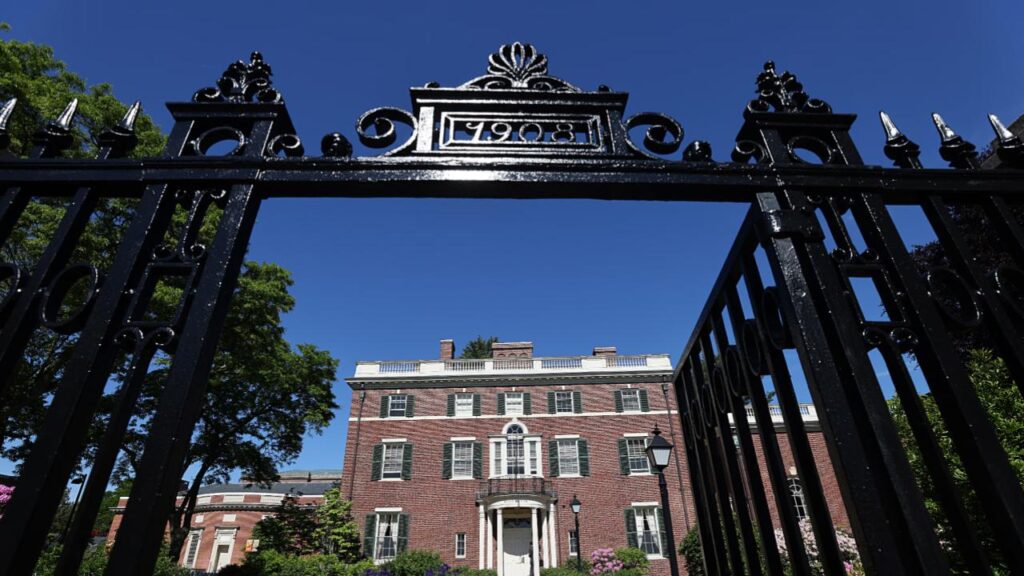Harvard University is staring down the barrel of a billion-dollar annual funding shortfall, triggered by an unprecedented standoff with the Trump administration. At the center of the storm: civil rights allegations, frozen research grants, and threats to the school’s tax-exempt status. The stakes are high—not just for Harvard, but for the future of academic freedom in America.

Harvard Faces Billion-Dollar Black Hole After Explosive Clash With Trump
| Issue | Impact |
|---|---|
| Federal funds frozen | $700M in research grants withheld |
| Endowment limits | 80% restricted or illiquid |
| Student body threat | 6,800+ international students at risk |
This showdown isn’t just Harvard v. Trump. It marks a turning point in U.S. higher education: Can universities resist political interference? Will federal aid be weaponized for ideological compliance? Harvard’s struggle may define the boundaries of academic autonomy in a deeply polarized America.
What Sparked the Clash?
On June 30, 2025, the Trump administration formally accused Harvard of violating Title VI of the Civil Rights Act by allegedly failing to protect Jewish and Israeli students from harassment. The accusation prompted a federal freeze on research grants and fresh scrutiny into Harvard’s tax exemptions and visa sponsorships.
Trump’s team framed the move as a crackdown on antisemitism; critics called it an act of ideological warfare. “This is not about protecting students. It’s about punishing dissent,” said a Harvard law professor speaking anonymously due to ongoing litigation.
Harvard’s Legal Counterpunch
In response, Harvard filed a federal lawsuit challenging the administration’s actions as “flatly unlawful” and a clear violation of First Amendment protections. Their legal team, led by high-powered attorneys Robert Hur and William Burck, is aiming to overturn the freeze and restore access to federal funding streams.
Backing Harvard is a formidable coalition: over 12,000 alumni, 24 universities, and 21 state attorneys general have filed amicus briefs in support. “This is about preserving academic independence, period,” said New York Attorney General Letitia James in a June statement.
The Money Math: Where Things Stand
At first glance, Harvard’s $53 billion endowment may look like a safety net. But the reality is trickier. Nearly 80% of that funding is legally restricted to specific uses. The university has already pulled $250 million from reserves to support research programs, but insiders say more drastic measures may follow. Among the pressures:
- Paused federal contracts and grants—affecting life sciences, AI, and public health projects
- Possible increases in the endowment tax rate
- Visa constraints that could impact nearly 27% of the student body
Mediation or More Mayhem?
Surprisingly, there may be light at the end of the tunnel. Trump teased a potential “mind-bogglingly historic” settlement via Truth Social, while Education Secretary Linda McMahon confirmed “progress” in backchannel talks.
But the clock is ticking. Oral arguments are set for July 21 in federal court. Unless there’s a breakthrough, this could drag on for months—possibly years.

What’s at Risk Beyond Harvard?
This isn’t just Harvard’s problem. If a school as wealthy and influential as Harvard can be cornered, what does that mean for smaller colleges? Or for schools with controversial curricula?
This confrontation could redraw the boundaries of university governance. Should the White House have the power to freeze research grants over political disagreements? And what guardrails are in place to stop future administrations from doing the same?
What Harvard Should Do Next
1. Activate alumni and donor networks.
Philanthropic support may be Harvard’s best buffer. Already, some mega-donors are pledging matching grants to offset losses.
2. Lobby Congress for guardrails.
Several lawmakers are drafting legislation to prevent executive overreach into higher education. It’s unclear how far this will go—but Harvard will likely lead the charge.
3. Bolster campus protections.
Harvard is updating its code of conduct and has formed a new task force to tackle antisemitism, signaling a good-faith effort to address the root concerns of the federal complaint.
A Defining Moment for Academia
From my own time covering education policy, I’ve never seen anything quite like this. It’s not just a story of funding or campus politics—it’s a test of how much intellectual independence our universities truly have.
For Harvard, the road ahead is rough. But how it handles this moment may set the tone for higher ed in America for decades to come.
FAQs
Why did the Trump administration target Harvard?
Allegations that Harvard failed to protect Jewish students from harassment led to a Title VI civil rights investigation and subsequent sanctions.
How much federal money is at stake?
Roughly $700 million in research grants, plus additional federal contract support.
Will international students be affected?
Yes. The freeze could impact Harvard’s visa eligibility programs, affecting over 6,800 students.
Can Harvard survive financially?
While its endowment is massive, most of it is restricted. Harvard may need to make cuts or find new revenue streams.






